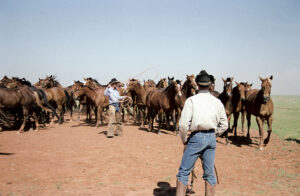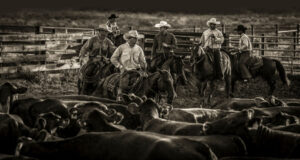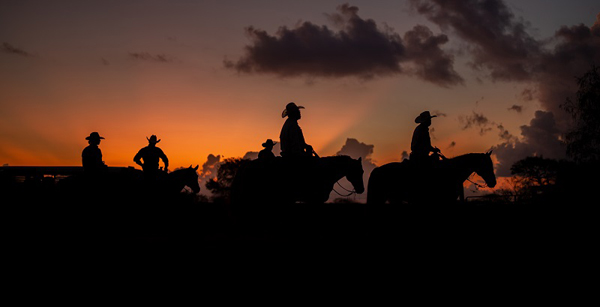AQHA Recognizes 100-Year Breeders The W.T. Waggoner Estate and King Ranch
The American Quarter Horse Association is proud to recognize two historic Texas ranches that have been breeding American Quarter Horses for 100 consecutive years: W.T. Waggoner Estate and the King Ranch. Even though the Association and its registry was founded in 1940, these two ranches already had horse herds, several of which were inspected and admitted for registration with AQHA.
W.T. Waggoner Estate
 Dan Waggoner set up in the cattle business in 1849. He and his son, William Thomas “W.T.” Waggoner, built the ranch known throughout the West as “Waggoners” into what today is an operation of some 525,000 acres running 10,000 mother cows. W.T. always sought the best horses available, bringing in foundation stallions Yellow Jacket, Yellow Wolf, Midnight, Blackburn and Pretty Boy. In 1940, his son E. Paul began registering horses with the new American Quarter Horse Association. Five years later, E. Paul purchased Poco Bueno, a yearling son of King P-234 who became a Hall of Fame sire that has impacted the line ever since at Waggoners, which in 1994 took the AQHA Best Remuda Award. The program has produced nearly 6,500 American Quarter Horses.
Dan Waggoner set up in the cattle business in 1849. He and his son, William Thomas “W.T.” Waggoner, built the ranch known throughout the West as “Waggoners” into what today is an operation of some 525,000 acres running 10,000 mother cows. W.T. always sought the best horses available, bringing in foundation stallions Yellow Jacket, Yellow Wolf, Midnight, Blackburn and Pretty Boy. In 1940, his son E. Paul began registering horses with the new American Quarter Horse Association. Five years later, E. Paul purchased Poco Bueno, a yearling son of King P-234 who became a Hall of Fame sire that has impacted the line ever since at Waggoners, which in 1994 took the AQHA Best Remuda Award. The program has produced nearly 6,500 American Quarter Horses.
“Poco Bueno was a great horse, and a lot of our mares go back to him,” said Trace Cribbs, Waggoners’ equine division manager. “We’ve had some real good studs over the years, but what really made our program were the Pretty Boy mares.
“We’ve bred a lot of mares to Smart Chic Olena, we’ve experimented with running bloodlines, and we don’t mind going back to some older lines, like Driftwood or a good rope horse that you can roll back in with performance, movement and cow. Right now, we’re evaluating a 3-year-old Jesses Topaz son named Justa Topaz (who traces to Mr Jess Perry, Peppy San Badger and the Poco Bueno stallion Poco King Tuck). We have a couple of sons of High Brow Cat–Cat Man Do and Purrfect Timing–who are doing really good jobs for us. We raised and sold a Peptoboonsmal son named Pocket Fulla Pepto, but we have two of his sons we really like. We have Tracer Bullet, a son of Dual Smart Rey, and Boyd Rice is riding a Playgun son for us, Waggin A Gun, so we’ll see how those pan out.
“We like the reined cow horse, and we are big proponents of the AQHA Ranching Heritage program,” Cribbs said. “But our No. 1 customers are cowboys. We look for horses with substance. We like horses to be about 15 to 15.2 hands, with a lot of bone, and average around 1,200 pounds. We want to get the structure and the brain–the trainability aspect–right, and take it a little further: Do we want a big-motored horse or a ‘pusher,’ where you kind of pump them to make them go? There are different jobs that one or the other kind are good for, so we need to raise both.”
“The Waggoner contribution to the Quarter Horse industry has long been recognized,” wrote Jim Jennings, recognizing the Waggoner Ranch for its 1994 AQHA Best Remuda Award. “Horses like Waggoner’s Rainy Day, Midnight, (One Eyed) Waggoner, Yellow Wolf, Yellow Jacket, Pretty Boy, Pretty Buck, Snipper W, Pep Up, Jesse James and, of course, Poco Bueno still appear in the pedigrees of many great horses of today. Some of these were bred strictly for ranch work, and others for the show arena, but they all had one thing in common, they were cow horses.”
W.T. Waggoner Estate sold in 2016 to Stan Kroenke, who owns the National Football League’s Los Angeles Rams and is husband of Wal-Mart heiress Ann Walton Kroenke. Along with 2004 Best Remuda winner Douglas Lake Cattle Co. in British Columbia, Waggoners is among seven ranches owned by Kroenke Ranches of Bozeman, Montana.
“We’ve kept our old bloodlines in our mares,” said Cribbs, who has been with Waggoners for 27 years and with the horse program for 25. “Those bloodlines are our history, and Mr. Kroenke did not want to lose that. That’s great for us–we have so much invested in these mares. Those ol’ girls are my kids, and I want to make sure that they are taken care of.”
King Ranch
 King Ranch is AQHA’s all-time leading breeder by number of foals, having produced more than 7,200 in its long history. In fact, four King Ranch horses registered by AQHA were foaled in 1922.
King Ranch is AQHA’s all-time leading breeder by number of foals, having produced more than 7,200 in its long history. In fact, four King Ranch horses registered by AQHA were foaled in 1922.
“King Ranch has been dedicated to breeding and raising quality American Quarter Horses for 100 years and AQHA is excited to acknowledge this historic achievement in the ranch’s and AQHA’s history,” said Karen McCuistion, AQHA director of member programs. “Their commitment to excellence over the past century is not only remarkable, it helps ensure the future of the horses we love and the ranching industry.”
Those 1922 horses included Little Richard, Celia 023, McBride Chestnut and Panchita Kleberg. Old Sorrel was the sire of Little Richard, Celia 023 and McBride Chestnut; Panchita Kleberg was by Pancho Villa who was by Little Joe. All four horses were inspected prior to receiving their AQHA registration numbers. In fact, Little Richard holds registration number 17, which puts him in what is considered the “foundation” sires in the AQHA Stud Book.
“The purpose of the horse program is to provide our cowboys with the best horses in the world for their daily work,” said King Ranch’s James Clement III. “What do our cowboys need? What do they want? Producing a horse that can stand up to this work, this heat, this climate, this country, is our No. 1 goal.”
For more than a century, form to function is why every horse foaled on the King Ranch today is descended from Old Sorrel, most through Mr San Peppy and his son Peppy San Badger. Clement works for the ranch and is a great-great-great-grandson of Richard King, who founded the ranch in 1853. The Santa Gertrudis, Laureles, Norias and Encino divisions comprise the historic ranches of King Ranch, which grazes more than 35,000 cattle and 200 Quarter Horses across 825,000 acres of South Texas.
It takes tough horses to handle it, and Old Sorrel proved to be exactly what was needed. A son of Hickory Bill, the sorrel stallion was foaled in 1915 out of a Thoroughbred mare from Kentucky and was purchased by the ranch while still on his dam from foundation breeder and neighbor, George Clegg.
Bob Kleberg, a grandson of Richard King, often said that Old Sorrel was the best cow horse the ranch ever had. The stallion was ridden by Bob and others until they were satisfied that he could do it all, with temperament, intelligence, cow sense, endurance, good feet and a good mouth. Bob perpetuated the stallion’s best qualities through careful line breeding, relentless testing and selection and rigorous culling.
In 1940, when AQHA was registering its first horses, King Ranch had eight sons and grandsons of Old Sorrel that were being bred to daughters and granddaughters of Old Sorrel. More than 100 descendants were in the first studbook, including Wimpy, who is P-1 in the AQHA studbook. One other Old Sorrel son, Tomate Laureles, was included in the first 19 numbers reserved for foundation sires.
“There is no greater honor for me than serving this ranch and this Running-W brand as a seventh-generation Kineño,” said Lee Roy Montalvo, the King Ranch Quarter Horse Manager. “Our ancestors were trying to build the perfect ranch horse. King Ranch was part of the foundation of the American Quarter Horse, and I think it is only appropriate for Waggoner Ranch and King Ranch to share this honor together.”
Today, the AQHA Best Remuda-earning King Ranch stands stallions The Boon by Peptoboonsmal; Kineños Moon by Ritas Sweet Badger; Marsala Red by Play Red; El Rey Hidas by Taquito Sugar. The ranch is also evaluating its homebred Coronel Del Rancho, a 6-year-old son of Not Ruf At All who is the ranch’s first bred and owned AQHA Versatility Ranch Horse world champion. The ranch breeds to one or two outside stallions each year and works closely with other historic ranching operations, including the Four Sixes Ranch.
“The importance of our history cannot be understated, but we are always looking forward,” Clement said. “We continue our commitment to breed the best possible cow horse for the King Ranch cowboys and to promote the American Quarter Horse in the U.S. and internationally.”
2023 AQHA Breeder Recognition Banquet
The 2022 50-, 75- and 100-year breeders will be recognized at the AQHA Breeder Recognition Banquet, slated to be hosted during the 2023 AQHA Convention. The banquet is tentatively scheduled for Sunday, February 26, at the Omni Hotel in Fort Worth, Texas. AQHA will also recognize the 2022 AQHA Best Remuda and International Best Remuda, 2021 AQHA Ranching Heritage Breeder of the Year, 2021 Top Ranching Heritage-Bred Sale of the Year and 2022 Top Money-Earning Ranching Heritage Breeder of the Year.
AQHA news and information is a service of the American Quarter Horse Association. For more news and information, follow @AQHA on Twitter and visit www.aqha.com/news.











